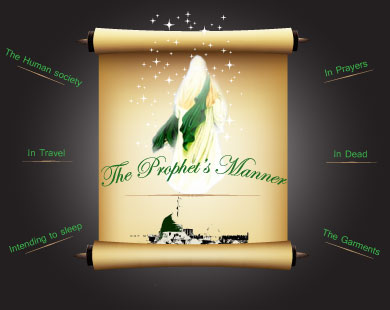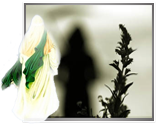From the morals of the Prophet (PBUHH) in public relations and communications is
that he had:
1. Moderate eye-sight: which means he used to look towards the land for a
longer time than towards the sky, as a sign of his humbleness and debasement to
God.
2. Forestalls others by greeting them: He used to greet before-hand
because greeting before talking is a sign of humbleness…. And to the beginner
with the greeting 69 doles, while to the replier, one.
3. Does not speak unless required: If he found an occasion for him to
speak for advice, teaching, ordering or forbidding….. Otherwise, he used to
remain silent.
4. Gratifies the amenities: Even if it was tit for tat, he never
dispraised anything. He used to thank God for His amenities however little
because they are from God.
5. His laugh was a smile: He never giggled or raised his voice, as the
inadvertent people do….
6. He used to say: “Inform me of the need of who does
not declare his need”; for him not to be shunned away from the
people’s needs, to help wherever possible…
7. Visits his friends: to feel assured of their comfort.
8. Asks people about their issues: to be aware of their situations and
surroundings.
9. Never stands or sits without a citation: as asking God’s forgiveness,
praying, praising God…. since these are atonements to sins…
10. Sits wherever the assembly ends: and he ordered to follow such act
because it is nearer to humbleness and further away from the desires of
oneself…. And Allah and His angels will pray on him when he leaves the assembly.
11. Vies in generosity to each of his guests as he desires: so as not to
honor one on the account of the other.
12. Whoever asked him a need, never returned unless his need was accomplished or
with good talk…. If he was able to perform the need, he’d accomplish it;
otherwise, the asker would return back satisfied by the sweet words, prayers,
advice or consultation provided by the Prophet (PBUHH).
13. Voices were never raised in his assembly, or over his voice, or screaming….
Infact, it is from the morals to speak calmly. God Al-Mighty said:
﴾Lower your voices surely the most hateful of voices is braying of the
asses﴿.
Luqman-19
14. Abandons the hypocrites: and hypocrisy is to defame others in an
intention to insult them, surpass them and show their intelligence on them. This
is out of hatred and envy, and causes dissimulation and heart diseases.
15. Does not interfere in what he has no concern of.
16. When he spoke, the audience listened, and only when he used to stop, they’d
talk, without rivalry, listening to each other.
17. PBUHH never interrupted anyone in his speech until totally finished.
18. PBUHH was just among people by listening to them and looking at them
equally.
19. He was the most eloquent of people and said: “I am
the most eloquent of Arabs and the people of paradise talk by the language of
Mohammad”.
20. He had a collective speech: (i.e., speaks appropriately, without a harming
interference nor a disturbing briefing).
21. He was heard saying: “I was sent with magnanimity
and the excellence of morals”; and whoever restricts himself and
augments his morals becomes much closer to the Prophet (PBUHH).
22. PBUHH was the bravest of people: as he used to rush into what people
feared, before them, where they used to hide behind him and no one used to
approach the enemies before him.
23. He was (PBUHH) very timid: “more than a virgin in
her veil”.
24. One day, an angel came to him and said: “O
Mohammad! Your God salutes you and Tells you: if you wanted, I would make for
you the savanna of Mecca out of gold pebbles”; so he said (PBUHH)
after raising his head up to the sky: “O God! I’m
satisfied for one day and I thank you and hungry for another to ask you”.
25. And he used to cry until his prayer place becomes wet, out of fear of God
Al-Mighty; with no committed faults.
26. He used to repent to God everyday 70 times, by saying
“I repent to Allah”.
27. And if his passions tightened, PBUHH, (whether out of great sorrow or
happiness), he used to touch his honorable beard a lot.
28. He used to sit with the poor, eat with the needy…. and inter-communicate
with his relatives without preferring one on the other.
29. He used to patch his own garment and mend his own shoes…. and eat with the
servant, sit on the floor, shook the hands of the wealthy and poor…. never
discriminated a needy for his poverty…. and never removed his hand, when
greeting someone, until the other did first, and greeted whoever he received,
rich or poor, big or small.
30. He was (PBUHH) sociable: smiles without laughing.
31. He used to look into the mirror and comb his hair…. and maybe look into the
water to adorn himself for his friends, as he did for his family. He said:
“God loves from his believer, if he goes out to meet
his friends that he well prepares himself and adorns”.
32. He used to greet the young and the old.
33. If he was asked to choose between two issues, he’d choose the hardest: to
train himself for refraining the evil desires of oneself, and riding the
difficult.
34. He never ate reclined, until his death, in a state of humbleness to God.
35. If he ate, he ate from what is close to him…. and if he drank, he’d drink
with 3 breaths (he’d drink then thank God and breath,
and repeat it three times).
36. His right hand was for eating and his left hand was for his body…. He loved
performing all his activities by his right hand.
37. His eye-sight was momentarily: a quick look or glance which does not
embarrass others…. PBUHH used to divide his moments among his friends, by
looking at each for equal times.
38. If he talked about any subject, he continuously smiled in his speech.
39. Almost all of the time, he used to sit facing Mecca (The Prayer’s Niche).
40. For his humbleness, some parents used to bring their child to the prophet to
bless him, and PBUHH used to put the child in his lap; so as to honor his
parents, and the child might urinate, that others would scream out from what has
happened, however the prophet used to forbid them from doing so…. saying: don’t
surprise and shock the child until he finishes his urination…. and PBUHH used to
continue reciting his prayers or the Names of Allah, until they’d leave, where
he’d wash his garment.
41. He would never accept that anyone walk beside him if he was riding, unless
the other rode with him. If the latter refused, he’d say:
move in front of me and reach our destination beforehand.
42. If he missed any of his friends for 3 days, he would ask about him, if his
friend was absent, he’d pray for him, if present, he’d visit him, and if sick,
he’d re-visit him.
43. Anas served the prophet 9 years, during which PBUHH never told him: can you
do this? Why did you do this? And never blamed him for anything…. And if Anas
blamed any of the prophet’s wives, PBUHH would say, defending him:
“leave him; this was by the book and destiny”.
44. He used to call out the people by their surnames to dignify them and
soften their hearts: his friends, the women who have children and those who
don’t, and the children.
45. He used to offer his seat to his guest, to serve him and soothe his soul,
and if his visitor denied, he used to insist until acceptance was achieved.
46. He used to take a certain road when going, and returns by another; and so
did his grandchild, our Imam Al-Rida, and ordered to do the same.
47. He used to go out after sunrise because sitting to pray and praise God
between dawn and sunrise is better than working.
48. When he used to enter a house, he used to sit in the first available place
he’d find.
49. He never spoke to the people by his inherent mind and said:
“We the prophets were ordered to speak to people
according to their minds”. And this was due to his noble morals,
humbleness and clemency.
50. He very much beseeched and implored God, continuously asking of Him
Al-Mighty: to adorn him with excellent features of refinement and magnanimity,
and he used to say in his prayer: “O God! Improve my
morals”, and he also said: “O God! Avoid me
from abominations”.
51. The prophet’s character was jesting for the sake of his people, for them not
to exaggerate in gracing him (which would make him refrain from the people by
being cautious from saying great things about him), God forbid, as the
Christians said in God’s follower Jesus, the son of Mary (A.S).
52. He used to speak with his companions with what is appropriate. Yazeed ibn
Thabit said: if we sat with the prophet and spoke to him about the hereafter, he
shared it with us, if we spoke about life, he did too, and if we spoke about
food and drink, he did as well.
53. He did not have a dishonest vision: which means to look at what you
aren’t supposed to see, or wink or hand symbolism.
54. If he met a Muslim, he’d start the greeting.
55. PBUHH said about the morals of the prophets: “The
most generous moral among the prophets, righteous people, martyrs and truthful
believers is to visit others in the sake of God”.
“From the prophets’ and righteous peoples’ morals is
gaiety when seen and greeting and saluting when met”.
56. From the precepts of the prophet is to give attention and eye-contact to all
the listeners and companions when speaking to a group.
57. PBUHH used to sew his own garment and repair his own shoes, and most of his
work at home was in tailoring.
58. And about the precision of his honesty, it was told that:
“PBUHH used to return the needle and thread”;
meaning that even if it was as much as the needle and thread, if it wasn’t his
own, he’d return it to its owners, and never neglect it.
59. And if he received a guest, he’d eat with him and never remove his hand from
the plate until his guest did, for his guest not to get embarrassed or stop
eating while he’s still hungry.
60. He used to debate the Jews and atheists, if they opposed him, and he’d
refute them; he did it many times.
61. If he was asked something, if he wanted to do it, he’d say yes; while if he
didn’t, he’d remain quiet, and doesn’t say “no” to anything.
62. If his friends came to him, they’d surround him in a circle, each completing
the other.
63. He never looked at what is desirable in his life, not to be taken away by it
and waste his time in it.
64. If something grieved him, he’d hurry to pray, resorting to it…. And he loved
to seclude himself (to recite, meditate, think and review his issues).
65. He used to tailor his garment, mend his shoes, open the door, milk the
sheep, and grind with the servant (if he was tired).
66. He used to prepare, ahead of time each night, his ablution water, for his
night prayers (as he used to burn the midnight oil), and didn’t ask it of
anyone.
67. He used to serve his family, helping his wives in their house work, and he
cut the meat.
68. He never starred at anyone…. for the other to feel comfortable.
69. He wore a silver ring in his right little finger (digitule) and he used the
flosser to clean his teeth in his ablution, he conducted funerals, visited the
sick, even if they were at the town’s extremities.
70. He sat with the poor, ate with the needy and served them by his hand;
dignified the meritorious people for their morals, never shunned anyone, and
accepted the apology of who apologizes to him.
71. He was the most smiling of people, unless the advice he’s giving does not
require smiling; and he might laugh but without giggling.
72. From his morals, if anyone sat by him while he’s praying he’d lessen the
prayer and reach up to him and ask: “Are you in need?”.
73. He used to say what is just, whether in content or anger.
74. He used to say (PBUHH): “O God! Enliven me as a
needy, depart me as a needy, and cram me along with the needy”.
75. If he was asked an issue or said a speech, he’d repeat three times for the
asker and the listeners to understand clearly; so that they’d be able to
transfer it correctly to their people and friends.
76. His friends used to greet him by: “Good morning or good night” which are the
greetings of the ignorant people; so God Al-Mighty sent that:
﴾and when they come to you they greet you with a greeting with which
Allah does not greet you﴿.
The Pleading One-8
God has replaced it with a better greeting; the greeting of the people of
paradise: “Peace be upon you”.
77. If he forgot something, he’d put his forehead on his palms and say:
“O God! Thee I thank, You are The Reminder of the
issues and Doer, remind me of what I forgot”.
78. He’d face the stone of his silver ring towards his palm, and look at it
several times.
79. He never shook the hands of women, and if he wanted to be acknowledged, by
the females, as a sovereign, he’d bring a bowl of water into which he’d put his
hand, then remove it and say to the women: “Sink your
hands in it as I have been acknowledged by you”.
In such an act, women are not to speak to males who are forbidden on them.
80. From his commandments was the loan (giving something to be returned as such)
and the simple loan - (non-interest loan, as lending pottery to be used and then
returned); he also entertained his visitors (by honoring them and caring for
them).
81. He repeated a lot: “There is neither might nor
power but in God”.
82. From his commandments is to comb the hair, trim the nails, and remove the
hair of the armpits and the pubic hair.
83. From the graceful commandments is to bury the hair, nails and blood.
84. He used to apply salve to his eyes with the autimony found in Hijaz (Kingdom
of Saudi Arabia); before he slept.
85. He always used to adorn himself with scents if he was offered it…. Scents as
musk and aloes-wood (both found in Hijaz) and other scents.
86. If it was Friday and he didn’t have scents, he’d ask for his wives veils,
he’d soak them in water, and then put them on his honorable face…. And it is
very favorable to scent yourself on Fridays…. where good deeds are registered as
long as the scent is present.
87. On Fridays, he used to trim his nails and cut his moustache, before going
out to the congregation prayer.
88. From the most lovable gifts to him were the scents.
89. He said (PBUHH): “Mosques are the sedentaries of
the prophets”, and it is favorable if you enter into a mosque, to
direct yourself towards the payer’s niche (Mecca).
* Book: The Prophet's Manners. By: Sayed Sami Bin Hassan Khadra



















